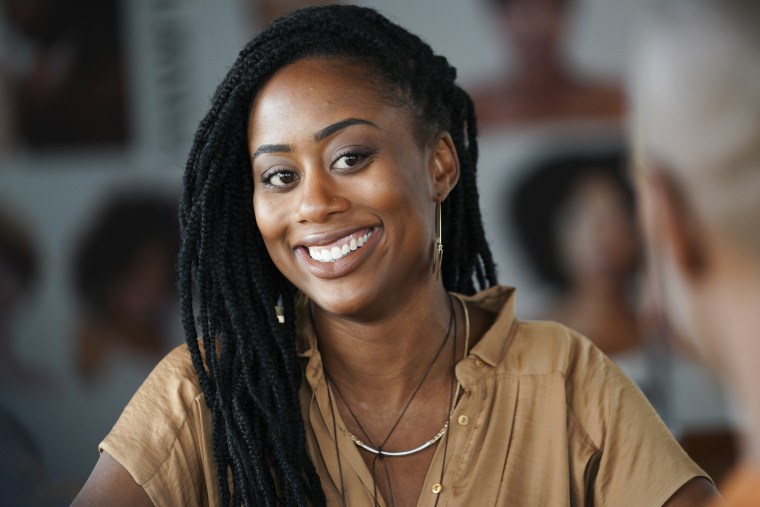Spinoff series can be hit or miss, so it would have been understandable if viewers had seen initial promos for Freeform’s “Good Trouble” and decided to avoid it.
The show plucks two leads from “The Fosters,” a series about a lesbian couple based in San Diego who adopt several children they’ve taken in from foster care, and throws them into Los Angeles as they try to establish their law and software engineering careers.
Yet “Good Trouble” has been able to break away from its prequel’s shadow, establishing itself as a sleeper hit and earning 100 percent approval on the review site Rotten Tomatoes.
The success of the series, which premiered the second part of its second season Wednesday, is due undoubtedly in part to fans’ attachment to the leads from “The Fosters,” Mariana and Callie Adams Foster (Cierra Ramirez and Maia Mitchell). But the show’s popularity can also be attributed to its large ensemble cast who live in the Coterie, a communal living apartment building, and the social justice issues they illuminate.
A prominent ensemble cast member and breakout star is Zuri Adele, who plays Malika Williams, a bartender and Black Lives Matter activist. Throughout the first season, Malika is on the front lines protesting the killing of an unarmed teen named Jamal Thompson by a police officer.
Malika’s activism affords her community as evinced by her close relationship with Jamal’s mother, Sandra (Nicki Micheaux), but it also has put her in a vulnerable position with law enforcement. “Good Trouble” unfolds with Malika, who was inspired by Black Lives Matters co-founder Patrisse Cullors, navigating the conflicting expectations placed on her as a black woman. In one plotline, Malika is offered a dream job, but her potential new employers want her to stop posting about Black Lives Matter on social media.
“I was first attracted to playing Malika because there was a lot of passion in her voice about black liberation and colorism,” Adele said in an interview. “But you can also see a lot of humor in her voice, and you see her friendships right away, and I appreciated the way the script tackled really dense issues in everyday millennial life.”
Although “Good Trouble” strikes a balance between moments of levity and exploring the gravity of real-world issues, Adele said that playing Malika can take an emotional toll and that it has taught her the importance of incorporating self-care in her life off set.
“Playing Malika really highlighted that there wasn’t a break from these issues, because they’re issues that I’m tackling in life,” Adele said. “I’m still in this black woman’s body after filming, so it really highlighted the need to take care of myself outside of filming, because Malika moves through so many emotions and so much grief that I also move through.”
For Adele, self-care takes many forms. She said she attends therapy, as well as singing and dancing lessons. She has also tried acupuncture and exercise classes. Her biggest priorities include giving herself permission to try new things and to feel comfortable with the fact that she may not be “perfect” at them, as well as spending time with friends and family. All this enables her to “take a breath” so she can “show up and tell these stories.”
Adele added that playing Malika and working alongside Cullors — who was a consultant on the first season of “Good Trouble” and has moved to the writer’s room for its second season — has also allowed her to “tap into” her activist side, something she had always wanted to do but wasn’t sure how to.
While Adele is not necessarily on the front lines protesting, she is approaching activism in a different way by trying to make theater and film more accessible for black artists. Adele received her bachelor’s degree from Spelman College in 2012 and an MFA from the University of California, Los Angeles in 2015. During her time at UCLA, she noticed that a number of graduates from historically black colleges and universities were gaining admittance to its School of Theater, Film and Television but were opting to attend other schools because they were receiving more funding from them.
Shortly after she graduated, Adele collaborated with the school’s administration and crowdfunded among friends and family to establish the Zuri Adele Fellowship for HBCU Alumni, an annual award that provides funding for a graduate of an HBCU pursuing his or her MFA at the School of Theater, Film and Television. Adele hopes to expand the award so HBCU alumni who attend other schools for their MFAs can also get financial support.
“The beauty of going to an HBCU is that we get to learn through the perspective of the African diaspora,” Adele said. “The playwrights, shows and history learned [there] all really informed my self-awareness before grad school, challenged me and helped me show up to grad school with a strong notion of who I was as a woman of African descent, and I want more people with that particular perspective and education to be in have accessible training in theater, film and television.”
